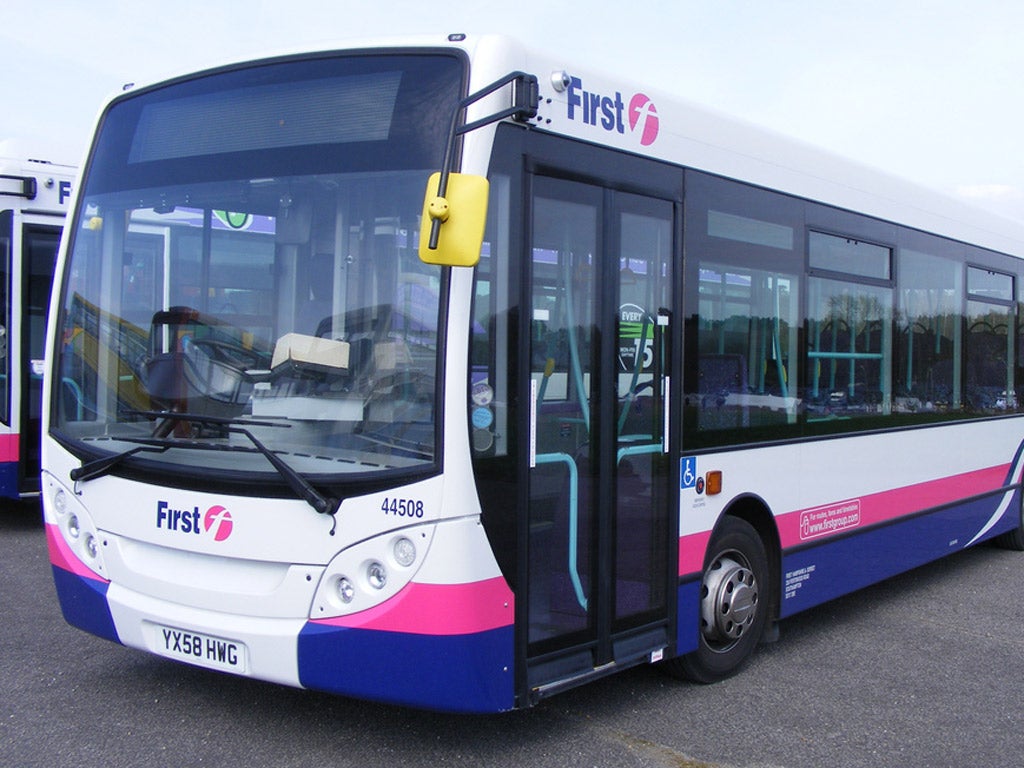Wheels are turning slower at FirstGroup
Fewer in the North can afford its fares right now, and that's costing the buses giant as the area provides two-thirds of its revenues. Lucy Tobin looks at the prospects of the company getting back on the right route

SCREEEEECH. That's the sound of Britain's buses of the North grinding to a halt. Not literally – the wheels are still a-turning, for now. But the country's North-South divide is now so stark that some of us in the North can't afford to take the bus so often. And that's hurting operator FirstGroup, Britain's biggest bus company.
Almost two thirds of its UK bus passenger revenues are generated in the North and Scotland – but nowadays its vehicles are far less full. FirstGroup admitted in January that tough trading in Scotland and the North of England was throwing up evidence of "a widening North-South divide." Then yesterday the Aberdeen-based firm reiterated its problem of northern exposure, and said it was planning on accelerating sales of bus businesses that bring in £100m of revenues as a result.
It has already offloaded operations in North Devon and King's Lynn and a major London depot to protect profitability. More will be axed because bus operating profits fell nearly 10 per cent to £134.4m in the year to 31 March while the operating margin of 11.6 per cent is expected to drop to 8 per cent this year.
Tim O'Toole, the chief executive, says: "We have seen a further deterioration of economic conditions, particularly in our urban operations in Scotland and the North of England. The impact of reduced government subsidies and funding to the industry... [is] more acute than originally estimated, and increased fuel costs."
First's costs have risen sharply in recent months. The Government has cut bus subsidies. Its fuel duty rebate, known as the Bus Service Operators Grant, pays about a tenth of bus running costs, but was cut by 20 per cent in last November's Budget. Industry figures say some Scottish routes could see their subsidy cut by twice that.
Rivals have beefed up their spending on advertising and promotions to lure passengers away from First. And those passengers were struggling: fewer jobs, lower demand for bus commutes – and the 60 per cent of First's passengers that hail from Scotland and Northern England were hit even harder. The Centre for Economics and Business Research says the North could see one in eight people out of work by 2016.
Yet just at a time when hard-up families couldn't afford it, First put up prices. Travellers in Bath and Weston-super-Mare, for example, saw ticket prices increase by up to 70p in January. And demand fell as a result.
"FirstGroup has several problems," says Paul Hickman, a transport analyst at Peel Hunt. "The North and Scotland where it operates most are more economically depressed while it is also facing economic headwinds and rising costs – not just in terms of the cut to the fuel duty rebate but also the rising price of fuel. Usually, that helps people move on to the buses, but First has admitted it tried to deal with the problem too much by putting up the fares. Their last price increase in January frankly didn't work, and faced significant resistance in the North and Scotland."
The company, whose 8,000 buses carry 2.5 million passengers a day, says it has recovery plans in place. Mr O'Toole says a new management team was working on a plan to stimulate growth in the bus business, including spending £160m on 1,000 new vehicles and £4m on refurbishing existing ones. It is also investing £27m in new ticketing technology.
First is also cost-cutting. Bus workers are the first victims: the company yesterday said it had made their pensions £73.3m poorer, after it switched them from being linked to the retail price index to the consumer price index, and capped pension payouts. First's shares have fallen 40 per cent in the past seven months but those of rivals such as Stagecoach have lost half that in the same period.
"Evidence from other companies suggest they are just not affected by First's problem," says Mr Hickman. "First is more concentrated in the North and has been slow to use marketing techniques, whilst others have got ahead."
The shares rose 7 per cent yesterday – "relief", says John Lawson of Investec. "Shareholders have had a torrid time recently with two major profit warnings in the last 18 months. This is a potential recovery stock story – although we're waiting to see how the restructuring of the UK bus unfolds."
First has some precedent in turnaround: its US yellow school bus business was hit hard by schools trying to trim transport bills. Trading disappointed but its performance is now on the up.
"There are some parallels with the US schools problem," concedes Mr Hickman. "But I think it's going to take a while, this company has got high debts, which look that much higher now its profit expectations are lower than we had thought."
Only time will tell whether First's Northern bus journey screeches to a halt or accelerates away with its fleet, drivers and passengers intact.
Join our commenting forum
Join thought-provoking conversations, follow other Independent readers and see their replies
Comments
Bookmark popover
Removed from bookmarks